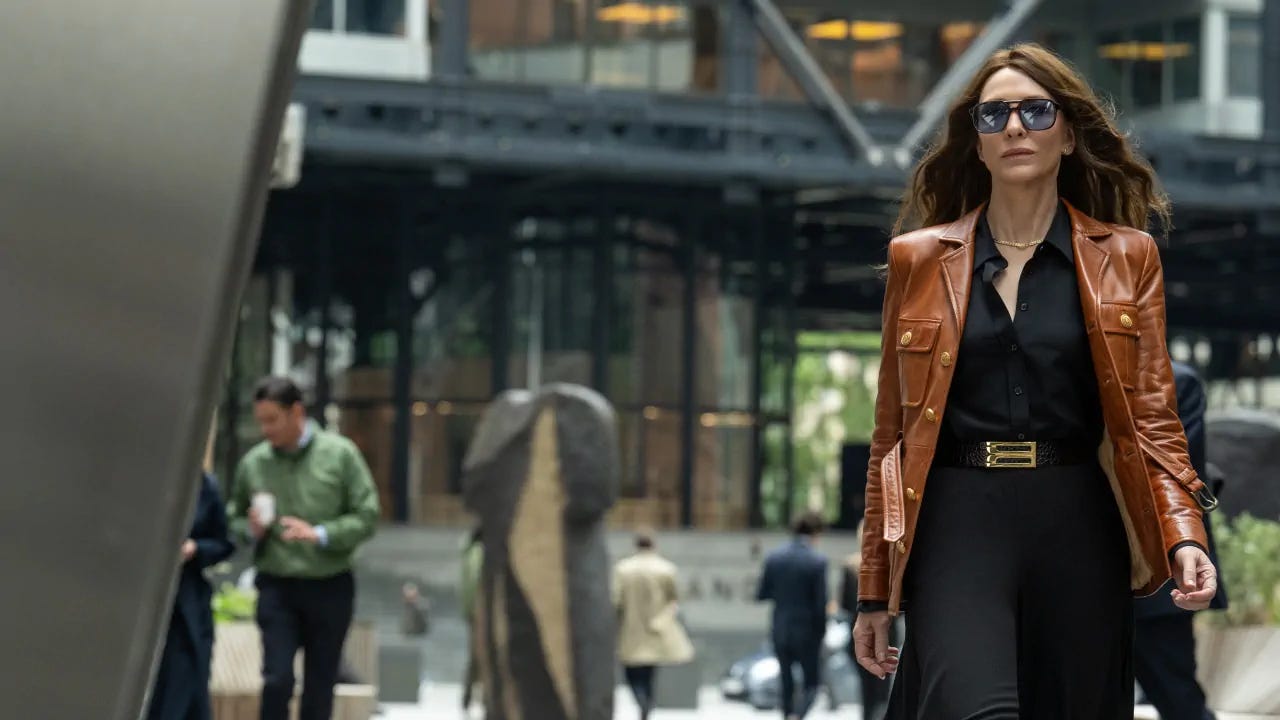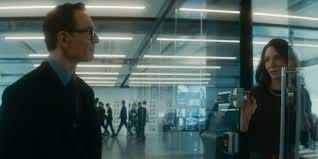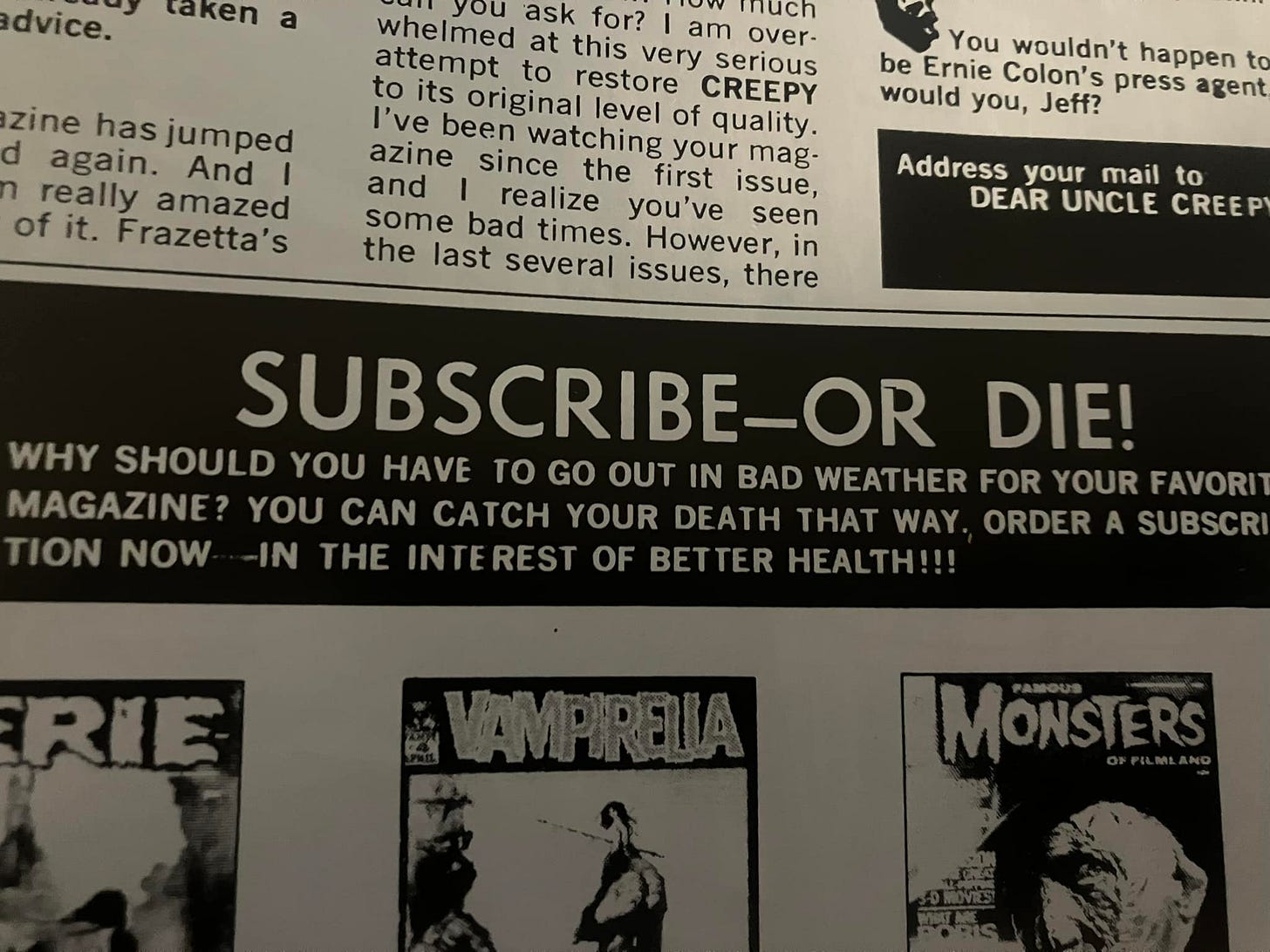Black Bag Is Steven Soderbergh at his Steven Soderberghiest
hell, I don't know what that means either!
You’ve got to give Full Frontal director Steven Soderbergh credit: he’s eclectic. It would have been easy for him to make Full Frontal repeatedly through sequels, prequels, television adaptations, musical adaptations, operas, comic books, and graphic novels that take place within the Full Frontal universe.
Soderbergh chose not to do that. Rather than answer the public demand for more Full Frontal, he has made a bunch of crazy-ass genre movies. That's the thing about Soderbergh: he’s gloriously eclectic. His filmography is diverse. That used to be a good thing. Now, diversity is the worst thing in the world, except for equity and inclusion. I get so mad just thinking about those words, individually and together. If you see someone doing diversity, equity, or inclusion, make a citizen’s arrest. Those are all crimes punishable by the death penalty now, so if you see someone trying to put up a Black History Month poster with Martin Luther King, you are legally allowed to kill them and their property as the spoils of the culture war.
You never know what Soderbergh will do next. A Final Destination sequel, maybe? Full Frontal 2000: Even Nakeder? Hopefully? He’s unpredictable. He’s fond of funky, non-commercial experiments, but he has such an offbeat sensibility that even when he makes commercial genre films, they can feel like funky, non-commercial experiments.
That’s true of Black Bag, a sexy spy movie made with a distinct sociological and creative distance. There remains something intellectual and cerebral about Soderbergh as a filmmaker. He always hovers just outside of the frame.
The elevator pitch for Black Bag can be boiled down to “Who’s Afraid of Virginia Woolf by way of Mr. And Mrs. Smith and James Bond.”
Black Bag finds Soderbergh working again with David Koepp, one of the most successful screenwriters ever. Koepp embodies the mainstream with a filmography that includes the lofty likes of War of the Worlds, Jurassic Park, Mission Impossible, Spider-Man, and Angels and Demons.
Koepp must get along with Soderbergh because Black Bag is the second film they’ve collaborated on this year alone. The other is Presence, which came out in late January and is filmed in the first person. That sounds interesting! Maybe I should devote a month or two to seeing all of the Soderbergh obscurities I’ve missed. There are a lot.
Whether it’s Full Frontal or Presence, Soderbergh loves to goof around, but Black Bag finds the Full Frontal hitmaker playing it relatively straight.
A sleek work of glimmering surfaces, Black Bag, casts the exceedingly handsome Michael Fassbender as George Woodhouse. He’s a nattily attired British intelligence officer famous for his gifts with a polygraph.
Black Bag takes place in England, just like The Benny Hill Show. Unfortunately, that’s where the similarities end. There is not a single sped-up slapstick sequence set to Boots Randolph’s “Yakkety Sax” in Black Bag. There isn’t a scene where cleavage is ogled, either. Apparently, Soderbergh is too classy for our country!
You know who’s not too fancy to make movies in God’s own USA? Dukes of Hazzard star John Schneiderr.
Lie detectors have been thoroughly discredited. They’re a pseudo-science rather than the real thing. Yet they figure prominently in Black Bag in a way that suggests that they’re useful and effective and not fundamentally worthless.
George is a true stoic. He’s cautious. He’s meticulous. He maintains a perfect deadpan that betrays nothing. He is very handsome, well-dressed, impeccably mannered, and good at his job.
I could not relate to him on those levels, particularly the part about being good at his job. Yet I could sympathize with the character because he seems on the spectrum. He may or may not be neurodivergent, but he seems, at the very least, autism-coded.
I imagine that would make being a spy either easier or much harder. George’s professional existence is both simplified and complicated by his wife, Kathryn St. Jean, also being a spy.
Cate Blanchett is tremendously sexy as the female lead, but it’s a sophisticated, understated sensuality. The sexuality of Black Bag is not the vulgarity of a blonde with enormous breasts spilling out of a string bikini dancing suggestively in the background of a Spuds Mackenzie commercial in the 1980s. It’s not as crude. This is a more European, grown-up eroticism, as opposed to the gaudier brand exemplified by singer, model, and actress Samantha Fox in the Reagan decade.
George learns that one of five colleagues is responsible for the leak of a powerful computer program called Severus that functions as the film’s MacGuffin. The suspects include Kathryn.
Our possibly autistic anti-hero would like to think that Kathryn couldn’t possibly be responsible, but even he has to admit that she gives off a major “I’ve stolen a powerful computer program and will happily sell it on the black market for a small fortune” vibe. She’s prickly and unlikable yet mesmerizing.
Kathryn seems untrustworthy. All five of the possible leakers seem sketchy. When you work as a spy alongside an office full of other spies, you can’t be too surprised when spying occurs.
The love of George’s life is purposefully inscrutable. When you’re living a double-, triple-, or even quadruple life, that’s an asset. It’s one thing for Kathryn to keep secrets from her government employers. It’s quite another not to be completely honest with your spouse.
It seems safe to assume Kathryn isn’t honest with anyone, including herself. She is an excellent liar. That is a superb quality for a professional spy to possess.
Black Bag is exceedingly chatty for a spy movie. It’s rare to see an espionage movie with many dinner party scenes. Black Bag revolts brazenly against the Cult of Likability at the popular, toxic, and counter-productive notion that protagonists must be likable and sympathetic, or audiences will be bad people for rooting for them.
I’m not sure that I would necessarily characterize the characters as bad, but they are awfully flawed. Incidentally, my 10-year-old son Declan is obsessed with Harry Potter now and gradations of evil.
If my son were to see Black Bag, he would be able to tell me exactly how evil the characters are, but this occupies a genre and a world full of dark shades of grey, black, and precious little light.
Fassbender emerges as the most sympathetic character because we see everything from his vantage point but also because he communicates the least and can be trusted the most.
Fassender’s scowling cipher also has a moral code and a sense of ethics that set him apart from his more duplicitous colleagues, a firm sense of who he is and what he can and cannot abide by.
I am a Steven Soderbergh fan. It would be wrong to call myself a die-hard obsessive because I don’t recognize half the movies he’s released in the last fifteen years. He puts out a LOT of movies. A lot of them fly under the radar.
They can’t ALL be Full Frontal. Some of Soderbergh’s movies, by definition, will be sub-Full Frontal.
Black Bag is even better than Full Frontal, but it’s also strangely disposable and forgettable in the way the filmmakers' lesser efforts often are.
Soderbergh is a box set director. At the end of his long and life career, someone should release a giant box set of all his films. That is the ultimate, perfect context for Black Bag.
Its director is a hell of an interesting guy, and Black Bag is fascinating within the context of his career and as an unusually assured and stylish thriller.
Incidentally, I just discovered that a book about The Onion is coming out tomorrow. How weird is that? I certainly was not interviewed for it. I don’t know if it’s about The Onion and The A.V. Club or just The Onion, but I probably won’t read it for a while, if ever. The subject matter is just too raw for me, even during my third go-round at The A.V. Club, but I am mighty curious as to whether or not I’m a character in the book or mentioned at all.
Three and a half stars out of Five













As somebody who grew up in Britain in the 80s, the popularity of Benny Hill on your side of the Atlantic was regarded with general incredulity and astonishment.
FWIW, I saw Samantha Fox in concert and got to meet her after the show. I distinctly remember her taking a banana from a fruit bowl backstage, holding it up to her ear, then saying with a grin, "It's for you!" and handing it to me. Some memories never leave you.